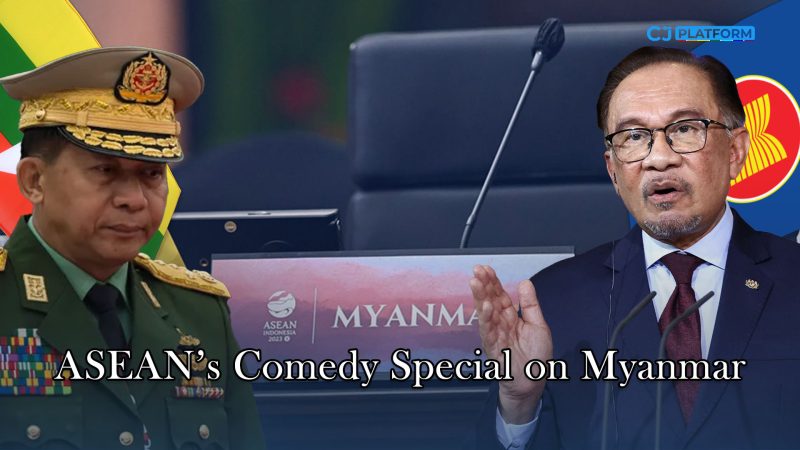ASEAN’s Comedy Special on Myanmar

When Malaysia assumed the ASEAN chairmanship, some naive optimists allowed themselves a sliver of hope—just maybe, Myanmar’s crisis might finally receive the serious attention it deserves.
Malaysia had, after all, been one of the few ASEAN members to consistently and openly condemn the Myanmar military’s coup. Prime Minister Anwar Ibrahim has been so outspoken in his criticism that he’s likely a regular target on the junta’s dartboards. Remember February 2023? At a forum titled “The Future of ASEAN,” hosted by the Malaysia-Thailand Chamber of Commerce, Anwar didn’t mince words—he said Myanmar should be temporarily suspended from ASEAN. Naturally, expectations began to stir: “Maybe Malaysia will actually do something.”
Let’s rewind for a moment. In December 2022, the UN Security Council passed Resolution 2669 on Myanmar—no vetoes, a rare display of global consensus. Around the same time, U.S. President Joe Biden signed the Burma Act, a significant move aimed at supporting Myanmar’s democratic forces. In 2023, Indonesia took over the ASEAN chair, promising support for Myanmar’s people. Hopes surged once more.
But as time wore on, it became painfully clear: the “international community” is a toothless elephant—massive, noisy, but ultimately ineffectual. ASEAN, for its part, continues to resemble a bureaucratic obstacle course, where even the tiniest progress feels miraculous.
So by the time Malaysia’s 2025 chairmanship began, expectations had dropped to near zero. Surely, we thought, they wouldn’t give us yet another tragicomic performance.
Enter Prime Minister Anwar Ibrahim. Once the fiery critic of the junta, he now appears to be offering little more than feel-good statements—placebo remedies while Myanmar’s people are left to paddle through hell.
A powerful earthquake tore through Myanmar, exposing the country’s deep vulnerabilities. Seizing the moment, the military junta announced a ceasefire. ASEAN’s chair saw this as a glimmer of hope—perhaps even an opportunity for progress. After all, aren’t politicians supposed to dream?
But while the junta talked about the ceasefire, its warplanes never stopped flying. The airstrikes continued. So, instead of confronting reality, the ASEAN chair tiptoed through political landmines and let his imagination run wild.
In a grand symbolic gesture, he invited junta leader Min Aung Hlaing to Bangkok on Myanmar’s New Year’s Day, April 17. They shared Thai cuisine and polite conversation. On that same day, the junta granted amnesty to 4,893 prisoners, only 369 of whom were political detainees. The ASEAN chair praised it as a “meaningful gesture.” The people of Myanmar blinked in disbelief. Was this real Anwar Ibrahim? Yes, it was.
That morning, Min Aung Hlaing wished Myanmar citizens safety and peace. But by 10 a.m., junta jets bombed villages east of Mogoke in Mandalay Region.
Still, the charade went on. That evening, a meeting was arranged at a Bangkok hotel, hosted by former Thai Prime Minister Thaksin Shinawatra. Min Aung Hlaing nodded solemnly, pretending to agree that aid for quake victims would require an actual ceasefire.
Following ASEAN procedure, the chair then met with the National Unity Government’s Prime Minister online on April 18. That same day, the junta bombed Leikkya village in Thabeikkyin Township, killing 13 civilians.
Yet the Malaysian prime minister called the meetings a “success” and proudly announced that neither side had objected. On April 23, Min Aung Hlaing declared another ceasefire—while airstrikes continued as usual. According to Nyan Lynn Thit Analytica, the junta launched 244 airstrikes in April alone, killing 201 civilians and injuring over 300. ASEAN looked the other way.
On May 6, citing “respect” for the ASEAN chair, the junta announced a third ceasefire, to last until the end of May. Then, on May 12, during that very ceasefire, the military bombed a school in Debayin Township, killing 22 students and two teachers. The international community condemned it. ASEAN said nothing, clinging to its principle of non-interference.
On May 25, as ASEAN foreign ministers gathered, the junta bombed a wedding in Kyaukkyi Township, killing 12 people—including the bride. But ASEAN’s dream diplomacy carried on.
At the leaders’ summit on May 26–27, ASEAN’s final statement praised the junta’s ceasefire, revealing where their true loyalties lie. In response, the junta announced a fourth ceasefire on June 1. Hours later, it bombed three locations in Thabeikkyin and Singu townships, injuring three women. No problem—ASEAN got its ceasefire announcement.
ASEAN stays calm, no matter how many Myanmar people die. It clings to its broken Five-Point Consensus, calling it a “roadmap” to peace.
On June 16, the Assistance Association for Political Prisoners (AAPP) reported that 6,807 democracy activists and civilians had been killed by junta forces. ASEAN remains unmoved. To Myanmar’s people, ASEAN is no longer a neutral mediator—it’s a cruel joke.

